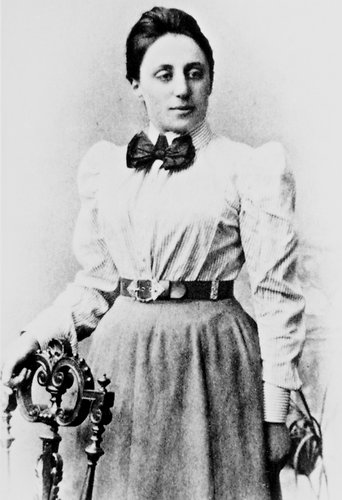Winner of the Spring 2019 StMU History Media Award for
Best Overall Research
In patriarchal societies, men limit the aspirations that women have, from how women are allowed to express themselves, to how women are allowed to pursue their livelihoods. One woman who faced these limits was the German-Jewish woman Emmy Noether. Noether’s passion was mathematics. She loved the world of mathematics, and she sought to make mathematics her career, at a time and place where women were largely excluded from such ambitions. German universities at the turn of the twentieth century were bastions of elite academic males. So how did this woman overcome those obstacles to her aspirations and succeed in becoming one of the most renown female mathematician of her age? Ironically, it all started with a man: her father.
Emmy Noether fell in love with mathematics because her father, Max Noether, was a mathematics professor at the University at Erlangen in Germany, where Emmy later started her own undergraduate studies.1 Max Noether’s research in algebraic-geometry studies ignited Emmy Noether’s passion for mathematics, and was the catalyst for her decision to go to college to study mathematics. And there, at her father’s university, she began her undergraduate studies in the year 1900.

In the early decades of the 1900’s, including the field of mathematics, it was rare for women to become students or faculty in Germany’s educational institutions.2 But Emmy gained acceptance to study mathematics, and after two years of her studies as an unclassified student, she excelled in the examination that allowed her to start her doctoral work as a matriculated student.3 Noether had also begun giving lectures and teaching with her father at the University of Erlangen, as an unofficial professor without pay and under the name of other official professors. For the next thirty years, her career consisted of pursuing research under her father’s wing and continuing on as a teaching assistant, being one of the few women in the department.
In 1930, Noether moved her research to Göttingen University, where she focused on commutative number fields, non commutative algebra, and linear transformations with Professor Helmut Hasse. As her research continued to expand, Emmy converted “algebraic number fields into theorems for ideals in arbitrary integral domains (and rings in general)” where the “ideals in rings” was introduced.4 Due to the new discoveries that were made, new ideals on elimination and algebraic varieties theories also took a new step for history.
One of her many well-known accomplishments in the mathematics field is the Brauer-Hasse-Noether Theorem, where she worked with fellow mathematicians Kurt Hensel and Richard Brauer in quantitative research. Their main idea of work in Cyclic Algebra was known as the “Proof of a Main Theorem in the theory of algebras,” and in November of 1931, their proof added its last addition of work.5 In Emmy’s contribution to the Theorem with Hasse and Brauer, she submitted what is known as “Emmy’s Method,” which is the reduction method that affected the collective theorem of cyclicity.

“Als Eingangsdatum erschien in der publizierten Arbeit der Tag, an dem das Manuskript bei Emmy Noether eingetroffen war.” This translates to “The date of publication in the published work was the day on which the manuscript was entered by Emmy Noether.”6 The quote is from the documented historical letter, “Anmerkungen zum Dokument vom 6.10.1927,” from Hasse and Noether in most of their timeline of research. Emmy Noether had a contribution of letters that were submitted for the Annals of Mathematics, yet she had been classified as an unofficial writer for the document itself.
Although her earlier contributions were not recognized or acknowledged, Noether’s work over the years all contributed to Emmy Noether being the first woman and the tenth honoree to ever receive the Ackermann-Teubner Award. This esteemed award, which she received in 1932, had been created as a way to recognize the analysis of mathematics and scientific work through research and published papers.7 Emmy Noether had received recognition as a history-making woman mathematician, and receipt of this award gave more acknowledgement to her algebraic theorem contributions to the world of mathematics. Events such as these allowed the awareness of her work to expand beyond the university, and her limitations as a woman mathematician began to decrease. Yet that was just about to change in 1932, as the Nazi Party in Germany climbed ever higher in each of the four elections that were held that year. Her position as a woman academic in a Nazi-controlled Germany started receiving negative attention. And the Nazis took the lead in harassing not only women academics, but especially Jewish women academics.
In January 1933, Adolf Hitler became German Chancellor and the Nazi Party then gained power throughout Germany. Educational institutions throughout Germany were affected by the changes of this new Germany, including the discipline of mathematics, where “the treatment of mathematicians of ‘unfavorable ethnicity’ like Jews” was now receiving increased scrutiny.8 This affected mathematicians at the University at Göttingen, where Emmy Noether faced increasing harassment for not only being a woman mathematics professor, but especially for being a Jewish professor teaching “Aryan” students. Even before the Nazi seizure of power, students, faculty, and staff in universities throughout Germany had been subjecting Jewish professors to a wide range of disrespectful behaviors. But now that the Nazis were completely in power, the disrespect escalated to outright harassment of Jewish students and Jewish professors, no matter who they were.9

The harassment of Jewish academics was followed up with new laws affecting all schools throughout Germany. Jews were forbidden to work at or attend schools meant for Aryan students. As a consequence of these actions and laws, many Jewish professors left their universities, left Germany, and immigrated, many of them making their way to the United States. This was especially true for Jewish mathematicians. Emmy Noether was one of dozens of professors forced to leave her career and leave her research in April of 1933.10
As this happened, Jewish academics “managed to keep contacts with Jewish mathematicians who were forced to immigrate” through journals.8 These journals retained possession of records and information on the people that had been enforced due to the Anti-Semitism Movement. In time, the Law of Restoration in 1933 established the dismissal of all Jews from Academic contributions and activity. Slowly the participation of Jewish scholars in Germany society began to decrease. The Nazi regime restricted employment opportunities for Jews and significant limited the freedom and rights of Jewish people for the foreseeable future.

Noether lived through these early months of the Nazi regime. She faced discrimination during and after her dismissal from her university work in April 1933. Months later, Noether had the option to go to Moscow with some of her fellow Jewish friends, but decided to immigrate to the United States, where she was offered a position to teach mathematics at Bryn Mawr College in Pennsylvania.12 In her new environment, Emmy Noether not only lectured her own classes and continued her algebraic research, but she taught and worked with other women for the first time. For three years after her arrival in the United States, she made many friends and continued to write letters to her brother Fritz Noether and her former colleague Helmut Hasse, from Göttingen, until her sudden death in 1935 from illness.
At her funeral at Bryn Mawr, she was finally acknowledged for her scholarly work in the Mathematical Annal by Hermann Weyl, and she was remembered for her dedication to her theorem discoveries with various professors, including Hasse and Brauer. Even before her time at Bryn Mawr, Noether knew that her “methods are working, conceptual methods and therefore have anonymously penetrated everywhere,” even in the early stages of her successful research.6
During times of trial, acceptance, denial, and discrimination of different kinds, like millions of women throughout history, Emmy Noether lived decades of her life fighting and beating discrimination for her being a woman. Women like her had long been limited in how they could be involved in politics and family planning. And in Emmy Noether’s case, these women were limited in their education opportunities. Specifically, by living in Germany and being born as a woman, education and employment opportunities were very limited, yet Emmy Noether spent her life defeating the odds by becoming a renowned woman mathematician, who went to college, received her doctorate degree, and completed and published research in a male dominated culture. Noether survived the discrimination of the Nazi regime and made history as a woman mathematician. Noether’s mathematical theorems are foundational to what students are taught in today’s classrooms because of her dedication and determination to be in the field of mathematics. She has left a lasting contribution to the mathematical theories that we still use today.
- Jose Ignacio Cogolludo-Augustin and Miguel A. Marco Buzunariz. “The Max Noether Fundamental Theorem is Combinational,” University of Zaragoza (February 2010): 1, https://www.researchgate.net/publication/45900664_The_Max_Noether_Fundamental_Theorem_is_Combinatorial. ↵
- Peter Roquette and Franz Lemmermeyer, Helmut Hasse Und Emmy Noether, Die Korrespondenz 1925 – 1935 (Universitätsverlag Göttingen, 2006), 34, http://www.oapen.org/search?identifier=610183. ↵
- Alice Silverberg and Dirk Huylebrouck. “Emmy Noether in Erlangen,” Mathematical Intelligencer 23, no. 3 (Summer 2001): 23, https://www.researchgate.net/publication/226231187_Emmy_Neother_in_Erlangen. ↵
- Emmy Noether, Ideal Theory in Rings (Idealtheorie in Ringbereichen), (University at Erlangen, October 1920), https://arxiv.org/abs/1401.2577. ↵
- Peter Roquette et al., Helmut Hasse und Emmy Noether, Die Korrespondenz 1925 – 1935 (Universitätsverlag Göttingen, 2006), 34. http://www.oapen.org/search?identifier=610183 ↵
- Peter Roquette and Franz Lemmermeyer, Helmut Hasse Und Emmy Noether, Die Korrespondenz 1925 – 1935 (Universitätsverlag Göttingen, 2006), http://www.oapen.org/search?identifier=610183. ↵
- A Biographical Encyclopedia, 2002 s.v. “Noether, Emmy (1882–1935),” by Hugh A. Stewart. ↵
- Stana Remus, “Mathematics in Nazi Germany,” (University of Glasgow, 2009): 1, 5, https://www.gla.ac.uk/media/media_338601_en.pdf. ↵
- Stana Remus, “Mathematics in Nazi Germany,” (University of Glasgow, 2009): 1, https://www.gla.ac.uk/media/media_338601_en.pdf. ↵
- Stana Remus, “Mathematics in Nazi Germany,” (University of Glasgow, 2009): 1, 5, https://www.gla.ac.uk/media/media_338601_en.pdf. Stana Remus states: “In total 145 mathematicians in academic positions were forced to leave Germany and this list includes Emmy Noether, Richard Courant and Hermann Weyl. Their main destination was the United States of America, where 82 of the 145 went, leading to America becoming the world centre of mathematics.” ↵
- Stana Remus, “Mathematics in Nazi Germany,” (University of Glasgow, 2009): 1, 5, https://www.gla.ac.uk/media/media_338601_en.pdf. ↵
- A Biographical Encyclopedia: Women in World History, 2002 s.v. “Noether, Emmy (1882–1935), by Hugh A. Stewart. ↵
- Peter Roquette and Franz Lemmermeyer, Helmut Hasse Und Emmy Noether, Die Korrespondenz 1925 – 1935 (Universitätsverlag Göttingen, 2006), http://www.oapen.org/search?identifier=610183. ↵



66 comments
Natalie Thamm
This is an awesome article. It is incredible the hardships Emmy Noether went through to first be accept into a program for math at all and then to suffer under restrictions from the Nazi on Jews. Even though she was not originally recognized for her contributions, I am glad that she was able to teach on her own and do her own research once she came to the US.
Mariah Garcia
Emmy Noether is an amazing woman who defied the norms. Her passion was mathematics and her passion grew for mathematics from the help of her father. She was constantly fighting for what was right and for respect. She accomplished so much throughout her years but to never give up makes her an inspiration. Overall, this was an amazing article and taught me about someone I didn’t know about.
Ruben Basaldu
I really enjoyed reading this article even though I am not all that interested in mathematics. I still found this article to be super informative and well written. It was nice to read an article about a field where it was mostly dominated by men and women were not as involved. I said this in another article but it is such a shame that this happened during this time where women were not as important because if she were around today she would be a huge deal even though she kind of already is in some eyes.
Sharriah Martinez
This article was so great I did not mind reading it a second time. Congrats on your nomination it was very well deserved. I feel like I learned some new things during this second read. Again i find it amazing that Emmy Noether fell in love with mathematics because of her father. She was a woman, and mathematician it was amazing to see her make a difference and put up a fight against equality. Thank you again Sarah.
Alicia Guzman
While I do not necessarily find joy in math myself, I am glad that others can find joy in it. I guess you could say that Emmy Noether cracked (the code to) the glass ceiling. It is wonderful that she lived in a time that everything she was the world hated, being a Jewish woman and she still persevered! Congratulations on your nomination!
Maria Martinez
I had never heard if Emmy Noether and her work as a pioneer of sorts in the world of mathematics, but after having read only this article I now have an admiration and respect for her and her determination. As the article explained Noether was pretty much set up to fail from the start, being a woman in that time period you’re already destined for little in life so her ability to have gone to college was an amazing accomplishment in and of itself. The fact that she then not only studied mathematics in her undergrad but got a doctorate degree was another crazy accomplishment and it is so sad that her career in Germany was disrupted by the Nazi regimes hate. It is important to remember strong women in history such as Emmy Noether as a reminder of the hardships that women before us had to endure and fight through.
Nawaf Almarwaie
great article, i love mathematics which grove me take the decision to read this amazing article.it shows how her father influenced her and made her love mathematics, especially when we talk about that period of time, where women were usually do not work or care about the whole idea of an education, however, she fought to achieve her goal and learn more about mathematics and to success, i believe she did not know that she was going to be remembered in the future for her great job.
Mariah Cavanaugh
I am not a math wiz by any stretch of the imagination, but I do know how important it is for women and girls to be involved in mathematics. It is for that reason that I was excited to learn about Emmy Noether. She fought against sexism and Nazis but was still cast out from the profession that she loved. I was glad to read that she was empowered by her family as well as those around her to follow her passion.
Nathalie Figueroa Soto
This was a really great article to read about! I wasn’t informed about Emmy Noether before reading this, so now I’m glad to have knowledge on a great mathematician who defied the gender norms of the time to become a student then educator when women were not frequently welcomed/allowed to. Even when she was being disrespected for being Jewish, she continued to teach and learn until her sudden death from an illness. She began learning from her father, and in the end came up with mathematical theories all on her own, many of which are in use even today. Incredible!
Engelbert Madrid
It’s unfortunate that Emmy Noether could have thrived in her academic career in mathematics; however, because of her gender and ethnicity, she remained as unimportant student. She was constantly fighting this long battle of sexism and Antisemitism at the same time, yet she found her escape to do her research and to earn her profession in mathematics. This is a great article.